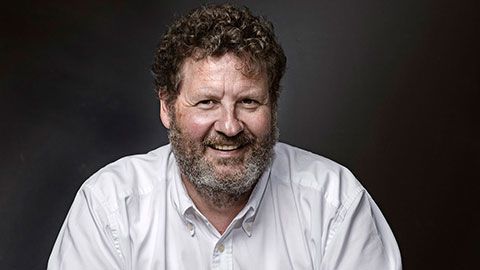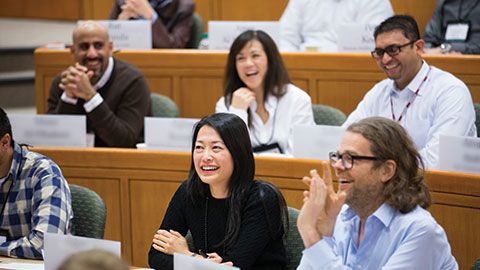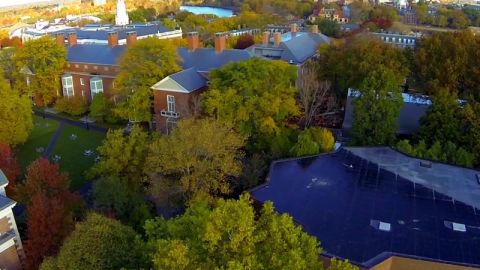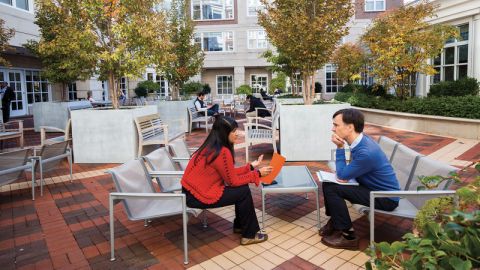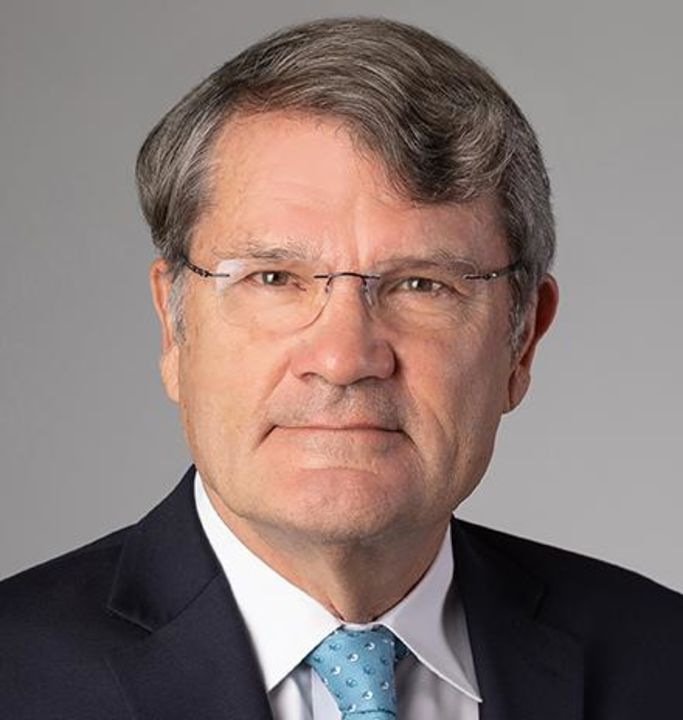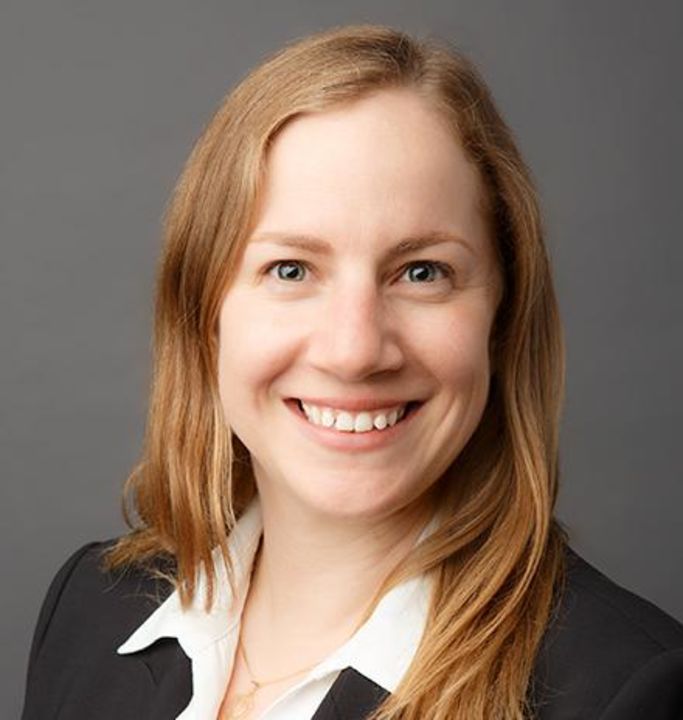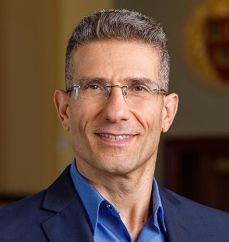Agribusiness Seminar
- Dates: 12–15 JAN 2025
- Format: In-Person Learning takes place on the HBS campus or a designated location.
- Location: HBS Campus
- Fee: $11,750
The program fee covers tuition, case materials, accommodations, and most meals.
Application Due: 02 JAN 2025

Gather strategic insights from across the industry and globe.
Summary
Climate extremes, economic shifts, geopolitical conflict, environmental constraints, new technologies, regulatory changes, consumer expectations—these and many other forces are creating pressures, uncertainties, and opportunities across global and local food systems. The current environment presents many challenges but also new possibilities for firms that can embrace innovation, develop new strategies, deliver value, and build resilience.
For more than 60 years, business leaders from around the world have gathered for the Agribusiness Seminar at Harvard Business School (HBS) to deepen their understanding of the food and agriculture landscape, exchange perspectives, strengthen their networks, and cultivate ideas to shape this vital industry. In our upcoming seminar, you will explore current and future industry dynamics through a dozen new agribusiness case studies, developing insights that can help you build competitive advantage and drive growth in your own firm and career.
-
Summary
-
Climate extremes, economic shifts, geopolitical conflict, environmental constraints, new technologies, regulatory changes, consumer expectations—these and many other forces are creating pressures, uncertainties, and opportunities across global and local food systems. The current environment presents many challenges but also new possibilities for firms that can embrace innovation, develop new strategies, deliver value, and build resilience.
For more than 60 years, business leaders from around the world have gathered for the Agribusiness Seminar at Harvard Business School (HBS) to deepen their understanding of the food and agriculture landscape, exchange perspectives, strengthen their networks, and cultivate ideas to shape this vital industry. In our upcoming seminar, you will explore current and future industry dynamics through a dozen new agribusiness case studies, developing insights that can help you build competitive advantage and drive growth in your own firm and career.
DetailsExpand AllCollapse All
Understand the interconnectedness of the global food system and the implications for
your businessUnderstand the interconnectedness of the global food system and the implications for
your business
- Examine the effects of local and regional events on global supply chains, trade, geopolitics, and international business operations
- Anticipate and manage risks arising from climate change and environmental pressures
- Assess strategies for entering and competing international markets
- Identify ways to build the resilience and flexibility needed to thrive in an evolving industry
Explore ways that firms build competitive edge and overcome constraintsExplore ways that firms build competitive edge and overcome constraints
- Leverage data and technology to improve decision making, operating efficiency, and responsiveness to customers
- Defend against commodification and drive profitability through product and marketing innovation
- Design robust, reliable supply chains that enhance competitiveness and customer service
- Adapt internal processes, cultures, and communication strategies to attract the next generation of innovators and leaders
Expand your personal and professional networkExpand your personal and professional network
- Extend your network by connecting and working with accomplished executives from various backgrounds, agribusiness sectors, and countries across the globe
- Build relationships with a diverse group of peers who can provide wide-ranging insights into your business challenges and career decisions
Understand the interconnectedness of the global food system and the implications for your business
- Examine the effects of local and regional events on global supply chains, trade, geopolitics, and international business operations
- Anticipate and manage risks arising from climate change and environmental pressures
- Assess strategies for entering and competing international markets
- Identify ways to build the resilience and flexibility needed to thrive in an evolving industry
Explore ways that firms build competitive edge and overcome constraints
- Leverage data and technology to improve decision making, operating efficiency, and responsiveness to customers
- Defend against commodification and drive profitability through product and marketing innovation
- Design robust, reliable supply chains that enhance competitiveness and customer service
- Adapt internal processes, cultures, and communication strategies to attract the next generation of innovators and leaders
Expand your personal and professional network
- Extend your network by connecting and working with accomplished executives from various backgrounds, agribusiness sectors, and countries across the globe
- Build relationships with a diverse group of peers who can provide wide-ranging insights into your business challenges and career decisions
Who Should Attend
- Current and rising leaders, ranging from senior executives in large multinational companies to heads of family businesses and agribusiness entrepreneurs, in all sectors of the industry
- Producers of crops and livestock
- Processors, traders, distributors, and marketers of agricultural commodities, biofuels, and food products
- Manufacturers and distributors of agricultural inputs, supplies, and farm equipment
- Marketers of consumer-branded fresh and packaged food products
- Grocery retailers, restauranteurs, and foodservice distributors
- Government agencies and nongovernment institutions focused on food, nutrition, farming, food security, agricultural trade policy, etc.
- Digital, biotechnology, and other technology players that shape the food, agriculture, and energy sectors
- Agribusiness-specialized investment and banking firms
Particularly appropriate for: Chairpersons, chief executive officers, presidents, managing directors, owners, and other company leaders who drive strategy for their firms.
The Agribusiness Seminar is generally not appropriate for individuals from consultancies and other professional services firms.
- Current and rising leaders, ranging from senior executives in large multinational companies to heads of family businesses and agribusiness entrepreneurs, in all sectors of the industry
- Producers of crops and livestock
- Processors, traders, distributors, and marketers of agricultural commodities, biofuels, and food products
- Manufacturers and distributors of agricultural inputs, supplies, and farm equipment
- Marketers of consumer-branded fresh and packaged food products
- Grocery retailers, restauranteurs, and foodservice distributors
- Government agencies and nongovernment institutions focused on food, nutrition, farming, food security, agricultural trade policy, etc.
- Digital, biotechnology, and other technology players that shape the food, agriculture, and energy sectors
- Agribusiness-specialized investment and banking firms
Particularly appropriate for: Chairpersons, chief executive officers, presidents, managing directors, owners, and other company leaders who drive strategy for their firms.
The Agribusiness Seminar is generally not appropriate for individuals from consultancies and other professional services firms.
Learning and Living at HBS
When you participate in an Executive Education program on the HBS campus, you enter an immersive experience where every aspect of the learning model has been carefully designed to facilitate your growth. Your learning will take place on your own, in your living group, and in the larger classroom, driven by the renowned HBS case method.
-
Learning and Living at HBS
-
When you participate in an Executive Education program on the HBS campus, you enter an immersive experience where every aspect of the learning model has been carefully designed to facilitate your growth. Your learning will take place on your own, in your living group, and in the larger classroom, driven by the renowned HBS case method.
Admissions Criteria and Process
Answering Your Questions
Application Submission
Application Review
Fee, Payment, and Cancellations
Answering Your Questions
Application Submission
Application Review
Fee, Payment, and Cancellations
What You Will Learn
Through faculty-led classroom discussions, case studies, small-group work, and insights from guest speakers, you will explore agribusiness trends and best practices covering an array of organizational, strategic, competitive, economic, and societal issues.
The curriculum is based on the world-renowned HBS case method—a highly interactive approach that engages participants in a dynamic exchange of ideas as they identify and test possible actions. The seminar will feature new cases incorporating the latest trends, evolving business models, competitive strategies, and novel thinking about industry opportunities and challenges. Each case focuses on a particular food or agriculture-related firm and the key decisions its leaders face. We enhance the learning with the unique opportunity to meet and hear from top executives featured in the cases.
-
What You Will Learn
-
Through faculty-led classroom discussions, case studies, small-group work, and insights from guest speakers, you will explore agribusiness trends and best practices covering an array of organizational, strategic, competitive, economic, and societal issues.
The curriculum is based on the world-renowned HBS case method—a highly interactive approach that engages participants in a dynamic exchange of ideas as they identify and test possible actions. The seminar will feature new cases incorporating the latest trends, evolving business models, competitive strategies, and novel thinking about industry opportunities and challenges. Each case focuses on a particular food or agriculture-related firm and the key decisions its leaders face. We enhance the learning with the unique opportunity to meet and hear from top executives featured in the cases.
Key TopicsExpand AllCollapse All
Creating more resilient, sustainable supply chainsCreating more resilient, sustainable supply chains
- How can business leaders anticipate and respond to trade disruptions, acute and chronic climate dynamics, and other forces affecting their supply chains? How can they make their supply chains more reliable?
- How can firms strengthen compliance and transparency in supply chains over which they lack full control?
- How should companies balance short-term and long-term considerations as they seek to operate more sustainably?
- How can companies address the different priorities of various stakeholders?
- Which companies will benefit from integrating vertically, and why?
- What kinds of partnerships will be most successful in the future?
Addressing the needs and demands of consumers around the worldAddressing the needs and demands of consumers around the world
- How can firms modernize while preserving their essential strengths, brand value, and longstanding customer and supplier relationships?
- How can businesses develop effective strategies for serving consumers with diverse expectations, preferences, values, and spending power?
- How can consumer demand for protein—whether meat, dairy, or plant-based—be met efficiently and sustainably?
- How can the agribusiness industry develop solutions to mitigate hunger and malnutrition?
- How should food and agriculture business leaders think about—and deliver on—their responsibility to consumers and other stakeholders?
Harnessing innovationHarnessing innovation
- How can firms nurture innovation in science, technology, business models, and partnerships to address challenges related to water and the environment, labor, nutrition, and other issues?
- Given rapid advancements in digital capabilities and the proliferation of new solutions, how should firms evaluate and integrate these tools into their operations?
- How can firms recruit and retain top innovation talent?
- How are leading companies cultivating a culture that embraces innovation?
Navigating a volatile landscapeNavigating a volatile landscape
- How can companies maintain momentum in the face of climate change, regulatory and policy change, global logistical bottlenecks, inflation, and unstable commodity markets?
- What other kinds of volatility may force companies to adapt their strategies and operations in the years to come?
- How do international relations and geopolitical conflict, including Russia's invasion of Ukraine, affecting the global food system?
- What are the key steps to anticipating change, managing risk, and responding effectively?
Supporting farms of the futureSupporting farms of the future
- What is the future of farming in developing and mature markets?
- How can farmers and other firms anticipate and navigate the impact of regulations related to climate change, immigration, and other important issues?
- How will the agribusiness industry manage the challenges arising from increasing water scarcity?
- Who will constitute the next generation of farmers, and how will farmers access the agricultural labor necessary to operate farms?
- How will technological advances evolve the practice of farming and bring important efficiencies?
Creating more resilient, sustainable supply chains
- How can business leaders anticipate and respond to trade disruptions, acute and chronic climate dynamics, and other forces affecting their supply chains? How can they make their supply chains more reliable?
- How can firms strengthen compliance and transparency in supply chains over which they lack full control?
- How should companies balance short-term and long-term considerations as they seek to operate more sustainably?
- How can companies address the different priorities of various stakeholders?
- Which companies will benefit from integrating vertically, and why?
- What kinds of partnerships will be most successful in the future?
Addressing the needs and demands of consumers around the world
- How can firms modernize while preserving their essential strengths, brand value, and longstanding customer and supplier relationships?
- How can businesses develop effective strategies for serving consumers with diverse expectations, preferences, values, and spending power?
- How can consumer demand for protein—whether meat, dairy, or plant-based—be met efficiently and sustainably?
- How can the agribusiness industry develop solutions to mitigate hunger and malnutrition?
- How should food and agriculture business leaders think about—and deliver on—their responsibility to consumers and other stakeholders?
Harnessing innovation
- How can firms nurture innovation in science, technology, business models, and partnerships to address challenges related to water and the environment, labor, nutrition, and other issues?
- Given rapid advancements in digital capabilities and the proliferation of new solutions, how should firms evaluate and integrate these tools into their operations?
- How can firms recruit and retain top innovation talent?
- How are leading companies cultivating a culture that embraces innovation?
Navigating a volatile landscape
- How can companies maintain momentum in the face of climate change, regulatory and policy change, global logistical bottlenecks, inflation, and unstable commodity markets?
- What other kinds of volatility may force companies to adapt their strategies and operations in the years to come?
- How do international relations and geopolitical conflict, including Russia's invasion of Ukraine, affecting the global food system?
- What are the key steps to anticipating change, managing risk, and responding effectively?
Supporting farms of the future
- What is the future of farming in developing and mature markets?
- How can farmers and other firms anticipate and navigate the impact of regulations related to climate change, immigration, and other important issues?
- How will the agribusiness industry manage the challenges arising from increasing water scarcity?
- Who will constitute the next generation of farmers, and how will farmers access the agricultural labor necessary to operate farms?
- How will technological advances evolve the practice of farming and bring important efficiencies?
The HBS Advantage
Our Executive Education programs are developed and taught by HBS faculty who are widely recognized as skilled educators, groundbreaking researchers, and award-winning authors. Through their board memberships, consulting, and field-based research, they address the complex challenges facing business leaders across the globe.
John D. Black Professor of Business Administration
Baker Foundation Professor, George M. Moffett Professor of Agriculture and Business, Emeritus
Thomas Henry Carroll/Ford Foundation Professor of Business Administration
Marvin Bower Associate Professor
James Dinan and Elizabeth Miller Professor of Business Administration
-
The HBS Advantage
-
Our Executive Education programs are developed and taught by HBS faculty who are widely recognized as skilled educators, groundbreaking researchers, and award-winning authors. Through their board memberships, consulting, and field-based research, they address the complex challenges facing business leaders across the globe.
Faculty ChairJohn D. Black Professor of Business Administration
HBS Unit:Business, Government and the International EconomyFacultyBaker Foundation Professor, George M. Moffett Professor of Agriculture and Business, Emeritus
HBS Unit:MarketingThomas Henry Carroll/Ford Foundation Professor of Business Administration
HBS Unit:Business, Government and the International EconomyMarvin Bower Associate Professor
HBS Unit:Business, Government and the International EconomyJames Dinan and Elizabeth Miller Professor of Business Administration
HBS Unit:Organizational Behavior
Your Peers Expand Your Learning
-
Your Peers Expand Your Learning
-
Global PerspectiveExperience the world in your classroom.Global PerspectiveExperience the world in your classroom.3%Africa7%Asia Pacific26%Europe10%Latin America6%Middle East48%North America3%Africa7%Asia Pacific26%Europe10%Latin America6%Middle East48%North AmericaExperienceExperienceYears workedYears workedExperienceYears workedLess than 10 yearsLess than 10 years10-14 years10-14 years15-19 years15-19 years20-24 years20-24 years25-29 years25-29 years30-34 years30-34 years35-39 years35-39 years40 years or more40 years or moreLess than 10 yearsLess than 10 years10-14 years10-14 years15-19 years15-19 years20-24 years20-24 years25-29 years25-29 years30-34 years30-34 years35-39 years35-39 years40 years or more40 years or more


